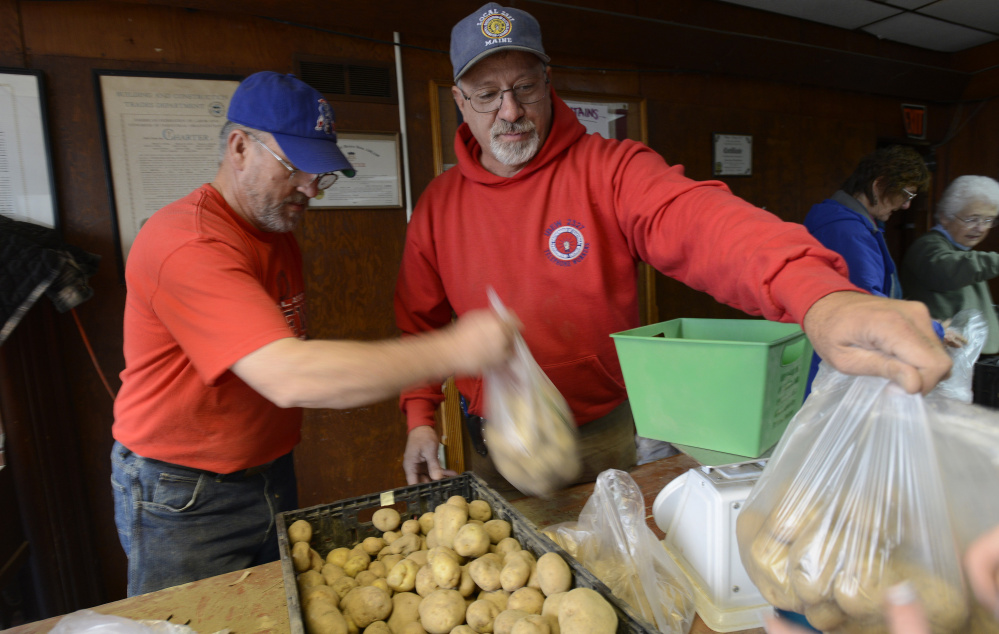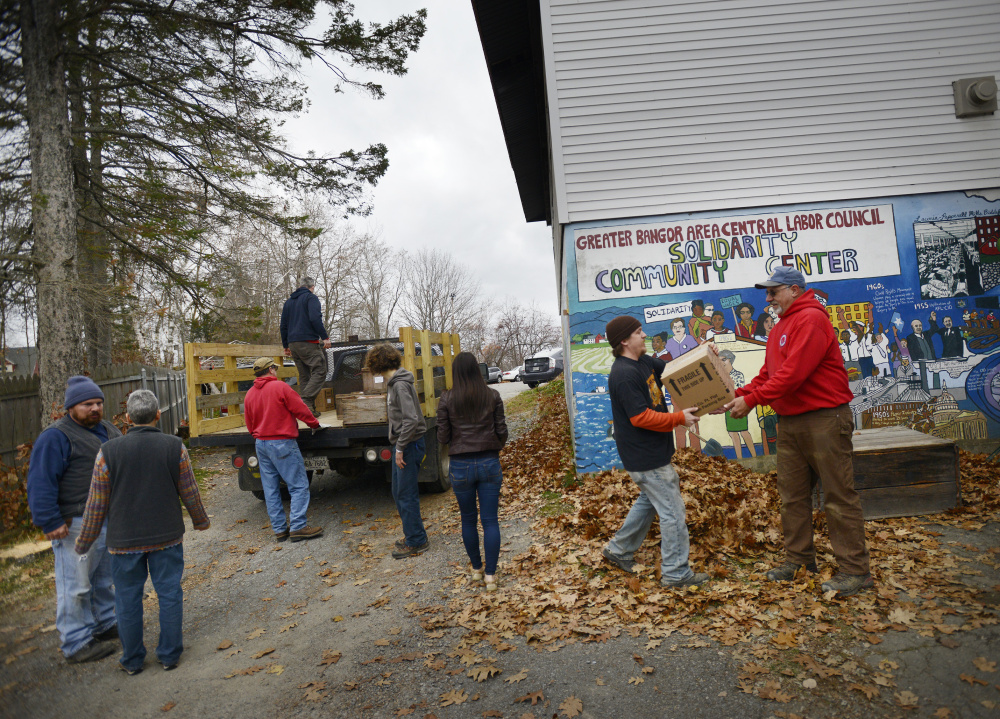BREWER — Christine Jordan stood at the side of the loading dock as Jack McKay outlined the game plan to a handful of men in what looked like a football huddle. She was wearing a bold red sweatshirt to show her union allegiance, but she looked shy.
“Adam, we’ve got turkeys at 12:30,” McKay said. His cheeks were pink and there was glee in his voice, the kind of glee that comes from closing in on executing a big job. Like a heist, although this was an entirely legal operation involving the preparation of 1,200 gift baskets of locally sourced Thanksgiving dinners for Mainers in need, enough to feed 8,000 people. Organized by Food AND Medicine, the nonprofit McKay founded, this massive undertaking is called the Solidarity Harvest. “How many?” Adam Thiesen asked.
“Three hundred,” McKay said. “Then another 400 at 3:30.”
Nearly twice that number of frozen birds would pass through the doors at Solidarity Center, the nonprofit’s headquarters in Brewer. The basement was full of bagged carrots and potatoes and beets, and its aroma was fresh and autumnal and good. Upstairs many hands were making fast work of sorting 900 pounds of cranberries into family-sized portions, weighing out turnips, slipping in 2 pounds of onions and a head of garlic. A guy had just pulled up with a truck full of apples from Garland. It was Thanksgiving preparations writ large, and it was somewhat overwhelming.
No wonder Jordan looked hesitant.
Last year at this time, her husband, Kelly, a FairPoint splice technician and third-generation phone company guy, was on a picket line, just beginning a strike that would drag on for 131 days, through every major holiday. And they received a basket from Food AND Medicine. “It was humbling,” Jordan said. “We weren’t starving to death, we did OK.” She still had her job working for a real estate attorney in Ellsworth. But strikes are scary and times were lean and they took the basket, even though it hit their pride hard to do so.
“Ten pounds of potatoes and three pounds of carrots – it goes a long way,” she said.
She had taken the day off from work to be there this year, thinking of those roughly 500 Verso workers who lost their jobs for good when the paper mill in Bucksport closed at the end of 2014, when Kelly was fighting for his job. Only about 60 of the former Verso workers have asked for the baskets so far, which McKay said is representative of how hard it is to ask for help. Even when the help is given so willingly, as Jordan’s was.
“After being on the receiving end, I felt not obligated but compelled to help out,” she said.
So did FairPoint service representative Jodi Savage-Wilson, who spent her morning sorting beets and paused to reflect on what the basket had meant to her last year, with two teenagers at home. “I froze some and tried to stretch out what I could,” she said. She, too, was paying it forward and would be returning to southern Maine with baskets for out-of-work union members in the Portland area.
Jordan and Savage-Wilson were part of a rotating crew of volunteers that has been at the Solidarity Center from 7 a.m. to 6 p.m. since Nov. 17 working on the baskets, overseen by Food AND Medicine staff, including McKay, Melissa Smith, Sandy Joy and Adam Thiesen. Their deadline is Nov. 24. “We’re making good headway,” Thiesen said one day last week. “There’s a lot of energy and excitement.”
And produce, 59,000 pounds of it to be precise, from over 30 farms and producers around Maine, from Calais (cranberries) to Skowhegan (carrots) and Mapleton (potatoes), the bulk of it paid for at market price, and some of it even gleaned (when Shalom Orchard Organic Farm and Winery called and said Food AND Medicine was welcome to their unpicked apples, a crew headed over and spent a day picking hundreds of pounds of apples). Maine farmers and Maine-grown food always had to be a part of the Solidarity Harvest.
When Food AND Medicine started this effort, which includes church groups, unions and other volunteers, in 2003, it had $6,000 of seed money, gathered at a gate collection to help laid-off workers at Eastern Fine Paper in South Brewer. There was debate over what to do with it. Among the suggestions, sending $40 gift cards for Sam’s Club or one of the other big box stores. Others shut that idea down.
“They said, ‘That is part of why we are losing our jobs!'” McKay said.
The idea of working with local farmers was raised and someone said that would be far too complicated logistically. That person was wrong.
But there is no denying that it is far more of an organizational task to gather the 5,900 pounds of produce from local farmers than it would be to place a large wholesale order.
“It has been a sense of empowerment and pride, that we can handle this,” McKay said, gesturing at the whirlwind around him.
That there has always been an imperative to keep these baskets homegrown (except for the box of stuffing and the turkeys, which feasibly couldn’t be local) has a special meaning to these passionate volunteers.
“This is an act of solidarity,” Food AND Medicine staff member Sandy Joy said.
To wit, they do not ask for handouts. They pay the farmer the price she or he wants, aware that they, too, are often living on slim margins.
The nonprofit already has many contacts at local farmers markets; Food AND Medicine helps fund the EBT double dollars program at markets in Brewer and Bangor, allowing low-income shoppers to double how much they can buy without taking money from the farmers. Farmers like Ernest Rollins. He was the guy with the truck full of apples and half-gallon jugs of cider.
He charged 50 cents a pound, a nickel break over his usual wholesale price.
“I have tried to give them a fair price, because I get to take advantage of their expertise and their help at farmers market,” Rollins said. His family had packed the apples into bags, sparing the volunteers at the Solidarity Center some work in the process. As he watched volunteers hoist the wooden boxes, he made it clear he had gotten something out of it, too, something other than those 50 cents a pound. “It’s been a really fun week.”
CORRECTION: This story was updated at 2:35 p.m. Monday, Nov. 23 to correct the number of pounds of produce contributed by Maine farms.
Send questions/comments to the editors.




